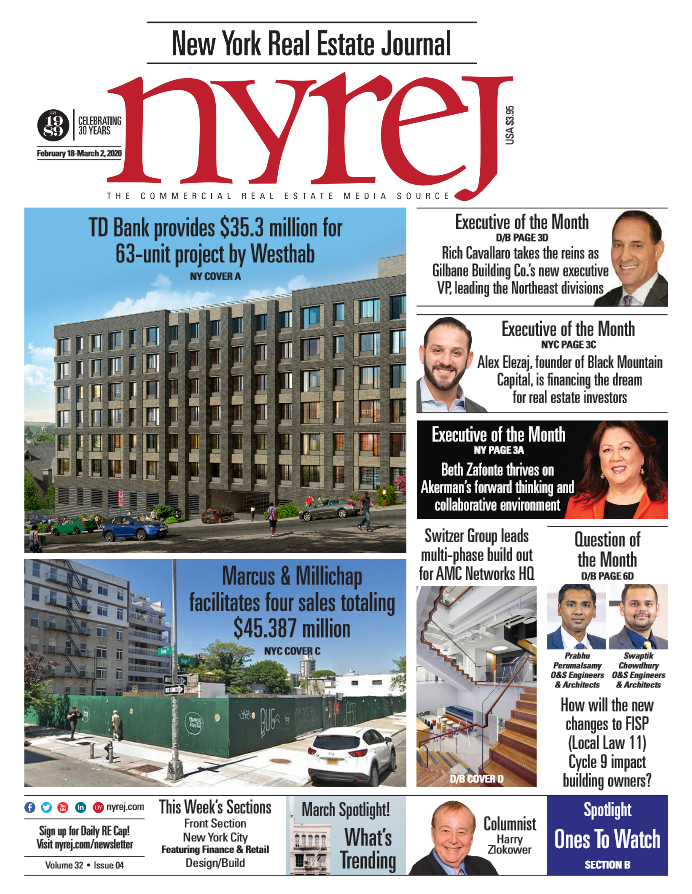How the New Changes to FISP (Local Law 11) Cycle 9 Will Impact Building Owners?
New York Real Estate Journal Issue February 18-March 2, 2020
Swaptik Chowdhury, LEED GA, EIT
Prabhu Perumalsamy, PE
On January 14, 2020, the New York City Department of Buildings (DOB) adopted the anticipated amendments to the rules governing the exterior wall inspections and repairs. The amendments will have significant impacts on the fiscal and the administrative requirements for filing a FISP (Local Law 11) report. Therefore, the important amendments and their impacts on building owners, condominiums, and co-ops have been provided below..
The amendment has increased the inspection requirement and mandates a minimum of one close-up inspection at no more than a 60’–0” interval of a building’s façade fronting the public right-of-way. The definition of public right of way has also been revised to include a public street, avenue, sidewalk, roadway, or any other public place or public way.
This amendment will cause a drastic increase in the inspection costs for buildings with wide frontages and frontages on public rights-of-way due to an increase in the number of required scaffold drops. Due to the expansion of the definition of public right-of-way, the owner will also have to provide protection for every public walkway when unsafe conditions are discovered. This will be especially burdensome for multi-building complexes with tower-in-the-park design that have extensive public paths and greenspaces.
The amendment now requires 7 years of building inspection experience with an intensive knowledge of NYC buildings and codes to register as Qualified Exterior Wall Inspector (QEWI). The amendment also revises the list of professionals who can conduct inspections under QEWI by excluding tradesman/technician and including professionals with either a bachelor’s and 3 years of FISP experience or with 5 years of total FISP experience.
This amendment further clarifies and increases the required qualifications for an architect or engineer to be granted the title of Qualified Exterior Wall Inspector (QEWI). It also increases the required experience of the technicians or professionals working under the QEWI to perform the critical examination of the building. This will benefit building owners because QEWIs and their teams will be more knowledgeable of about identifying exterior wall conditions and their causes that should produce more comprehensive and accurate inspections and ultimately safer buildings.
This amendment now requires a minimum of one probe per elevation for buildings with cavity walls. The probe is required to be performed at every odd cycle, beginning with Cycle 9.
This amendment affects owners of cavity-wall buildings both financially and logistically. In addition, to paying for a contractor to perform the probes and the associated site protection costs, the owners will also have to coordinate with the architect and contractor to source-matching bricks or veneer for the probe area, and this problem will be further exacerbated in landmark districts and buildings. However, DOB has provided exemption for building owners who can sufficiently document a completed wall-tie repair program in last 10 years or have a building that is less than 10years old.
All unsafe conditions must be corrected within 90 days from the submission of the critical examination report.
This amendment extends the timeframe for the owner to correct unsafe conditions from 30 to 90 days, however Owners are still required to install the necessary public protection immediately upon the discovery of unsafe conditions. The QEWI can recommend an extended timeframe if 90 days is not feasible due to the nature of the repair, but the owner is responsible for notifying DOB of any delays to the repair beyond the recommended timeframe.
DOB has significantly increased the Civil Penalties related to FISP in Cycle 9.
Late filing has increased from $250per month to $1,000 per month, and failure to file has been increased from $1,000 to $5,000 per year following the closing date of the applicable filing window. Failure to correct an unsafe condition will incur a civil penalty of $1,000 per month unless the Commissioner grants an extension of time to complete the repairs. In addition, the DOB is imposing a new civil penalty based on the length of sidewalk shed installed around the building. Starting in Year 2, the civil penalty will be $10 per month per linear foot of shed installed. The penalty will increase by an additional $10 per month for every year the shed remains installed. These penalties represent a drastic increase and are intended to spur buildings to expedite their repair program and to hasten the removal of sheds from city sidewalks. The changes will also cause a financial burden to many owners, co-ops, and condos around the city that do not have the means to immediately correct unsafe conditions.
The building must post a certificate issued by the Commissioner indicating the most recent condition of the building’s exterior walls and appurtenances.
Similar to posting elevator inspection certificates, buildings must now publicly display the building’s façade condition in the lobby or vestibule. This is another measure meant to spur building owners to remedy Unsafe or SWARMP (Safe with a Repair or Maintenance Program) conditions and achieve a safe exterior wall status.
The newly adopted amendments are the most significant changes since the FISP program was first introduced. The amendments impose new and increased requirements in all phases of the program from scheduling to inspections and repairs and an associated increase in costs to comply with all the requirements. This makes it all the more important for owners to choose an architect or engineer who has the required experience in accurately assessing exterior wall conditions, taking a practical approach to designing repair programs that account for the owner’s financial situation, and is able to provide reliable construction oversight to minimize change orders and cost overruns to maintain the owner’s bottom line.
If your building needs to file a FISP report, please contact O&S today: (646) 736-0699.
Check out some of our Envelope Services HERE

